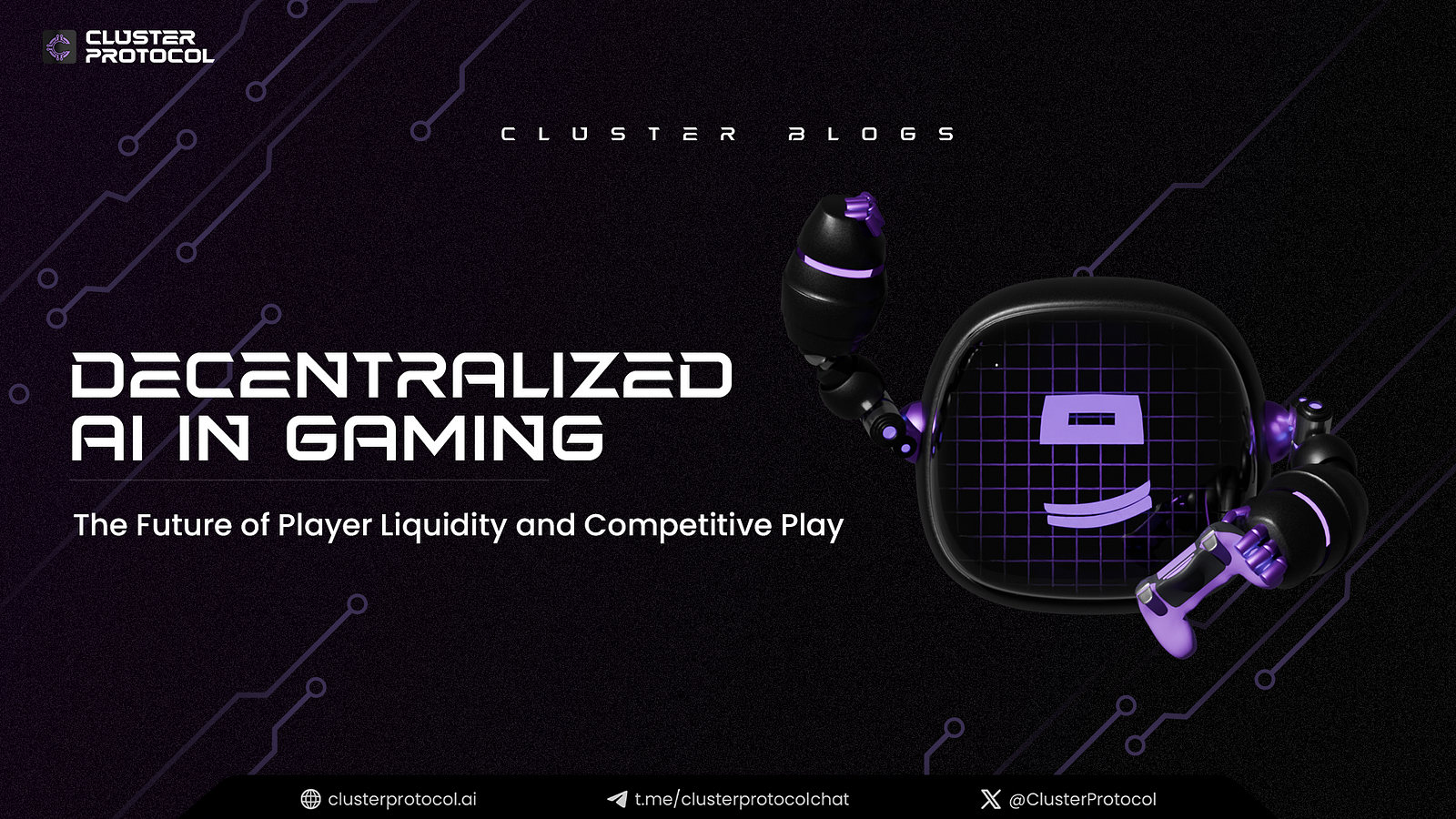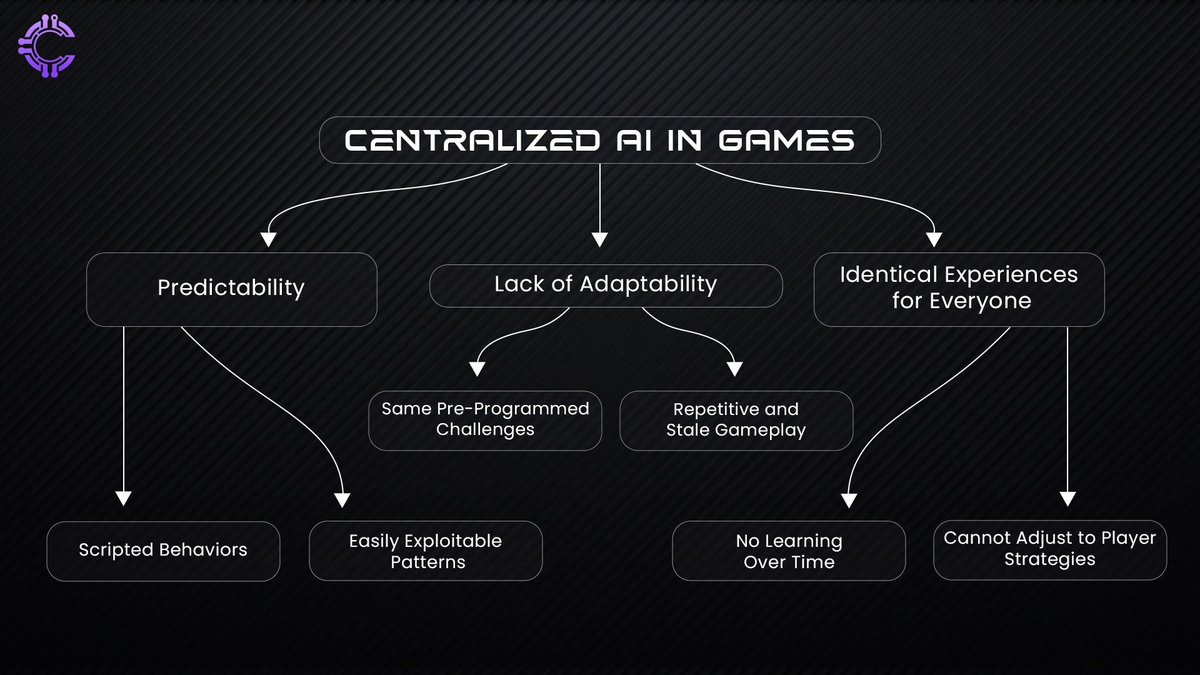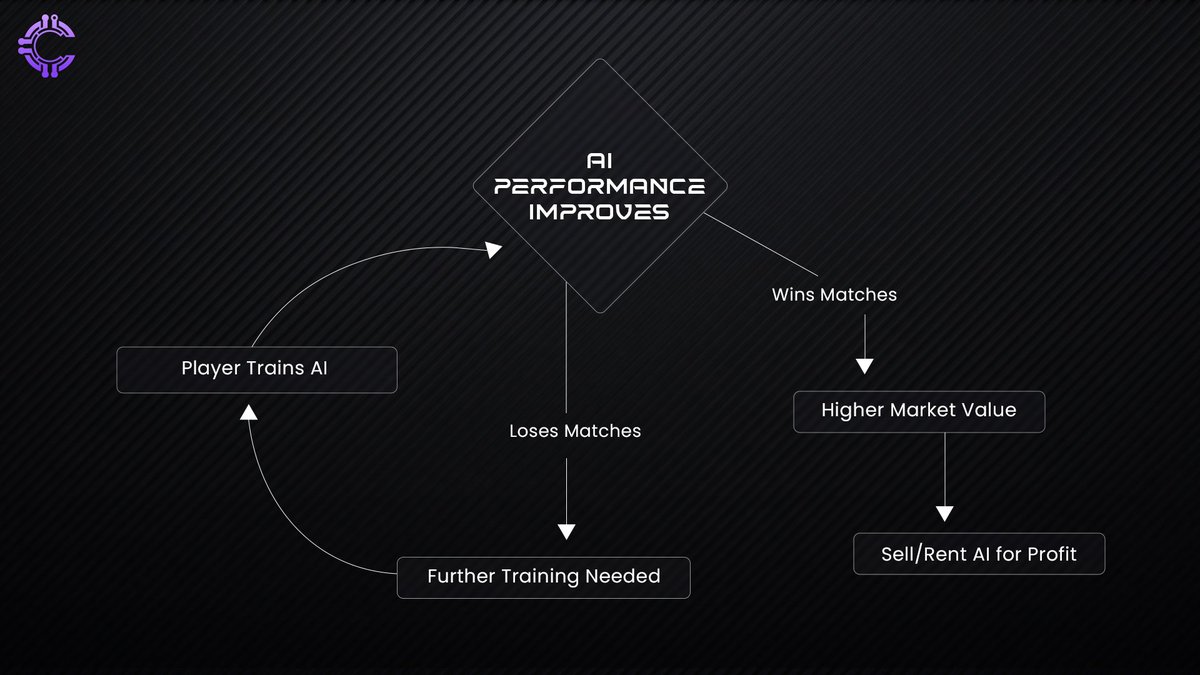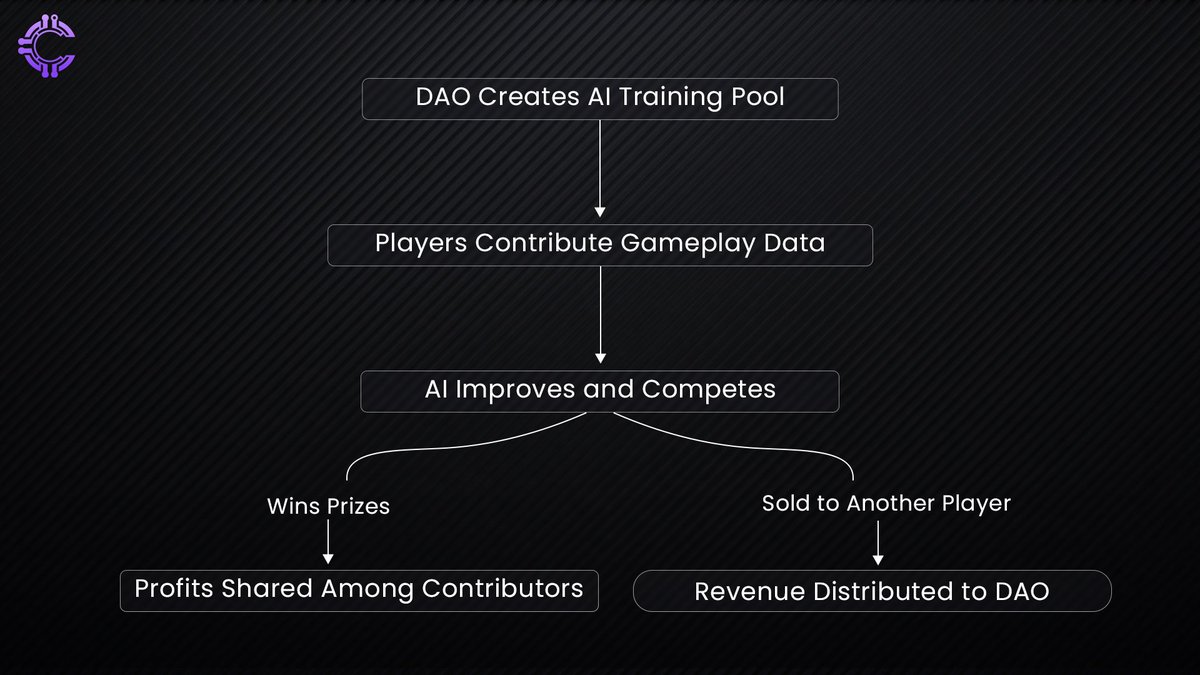Decentralized AI in Gaming: The Future of Player Liquidity and Competitive Play
Feb 4, 2025
9 min Read

The world of multiplayer gaming thrives on player liquidity - the steady flow of active participants who keep matchmaking balanced, queue times short, and in-game economies thriving. Without it, even the most well-designed games risk stagnation. Established titles like Counter-Strike and League of Legends maintain their dominance through sheer player volume, while new and indie games often struggle with the cold start problem- too few players at launch leading to an unplayable experience.
Web3 games face even steeper challenges, battling high acquisition costs, complex onboarding, and skepticism about blockchain gaming. Attempts to artificially boost player engagement with unsustainable tokenomics, as seen in early Play-to-Earn (P2E) models, have largely failed. Meanwhile, AI-powered NPCs, long used to fill gaps in matchmaking, remain static and predictable, failing to provide the immersive, adaptive competition that players crave.
Enter decentralized AI driven agents - a revolutionary approach where AI agents aren’t just pre-programmed bots but player-owned, evolving entities that learn, improve, and contribute to a dynamic gaming ecosystem. This shift enables AI-powered player liquidity, personalized AI training, and even new revenue streams where players can train, trade, and monetize their AI fighters.
Could this be the future of competitive gaming? In this blog, we explore how decentralized AI is reshaping multiplayer gaming, from AI-driven esports to privacy-first AI development, and how players, not studios, will own and shape the next generation of gaming AI.
The Invisible Heartbeat of Multiplayer Gaming
For decades, multiplayer gaming has relied on a critical but often overlooked factor: player liquidity. Every competitive game - whether it’s Counter-Strike, League of Legends, or Fortnite - depends on a steady, active player base to ensure balanced matchmaking, short queue times, and a thriving in-game economy. Without it, games stagnate. New titles struggle to gain traction, and even established games face an inevitable decline as engagement drops.
The Problem: Why Player Liquidity is the Lifeblood of Multiplayer Games
Every multiplayer game needs players - lots of them. But maintaining a healthy, engaged user base is harder than it looks.
1. The Cold Start Problem
New multiplayer games struggle with low initial player counts, leading to long wait times, unfair matchmaking, and poor first impressions. This creates a vicious cycle - players leave due to bad experiences, making the problem worse.
2. The Web3 Challenge: High Costs and Skepticism
Web3 games face additional hurdles. According to Delphi Digital’s gaming report, user acquisition costs for Web3 games are 77% higher than traditional mobile games. This is due to a combination of:
- Skepticism toward blockchain gaming
- Complex onboarding (wallet setup, crypto transactions)
- Early-stage game economies that aren’t yet sustainable

3. The Unsustainable Tokenomics Trap
Axie Infinity, once the face of Web3 gaming, grew rapidly by rewarding players with tokens for their time and effort. But when the supply of rewards outpaced demand, the in-game economy collapsed. Other play-to-earn (P2E) games followed a similar trajectory - momentary spikes in player liquidity followed by an inevitable crash.
The takeaway? Throwing tokens at players isn’t a sustainable way to ensure engagement.
The Current State of AI NPCs and Their Limitations
Most games today rely on centralized AI to fill gaps when players aren’t available. But these AI-driven opponents - whether in single-player campaigns or multiplayer bot lobbies come with severe limitations:
Predictability – AI enemies often follow scripted behaviors, making them easy to exploit once players recognize their patterns.
Lack of Adaptability – These NPCs don’t evolve over time or adjust to different playstyles.
Identical Experiences for Everyone – Since AI is centrally controlled, every player faces the same pre-programmed challenges, leading to repetitive and stale gameplay.

While recent advances in machine learning have improved AI-driven opponents, the dream of truly unique and adaptive gaming experiences remains unfulfilled.
Breaking Free: What Makes Decentralized AI Different?
Decentralized AI introduces a new paradigm - one where AI agents aren’t just static NPCs but dynamic entities that learn, evolve, and contribute to the gaming ecosystem. Unlike traditional AI, which is controlled by a single studio or developer, decentralized AI operates on distributed computing networks, leveraging player-owned agents that grow and improve over time.
Player-Owned AI Agents – Imagine AI-driven characters that belong to players, rather than developers. These AI entities could be trained, customized, and even traded, much like digital assets in Web3 games.
Collective Training & Shared Learning – Unlike centralized AI, which is restricted to pre-programmed behaviors, decentralized AI can learn from millions of gameplay interactions across different games and platforms, making each match more dynamic and unpredictable.
Your Personal Army: Training and Trading AI Companions
Decentralized AI isn’t just about making games more competitive, it’s about giving players control over AI agents in ways never seen before. Instead of facing generic, pre-programmed bots, players can train, customize, and even trade AI companions, turning AI training into a core part of the gaming experience.
Customizing AI Behavior
Imagine an AI teammate that doesn’t just follow basic commands but learns from your playstyle. Whether it’s an aggressive duelist in a shooter, a tactical support in a MOBA, or a skilled striker in a sports game, decentralized AI agents can be fine-tuned to match individual preferences, strategies, and even personality traits. Players could use reinforcement learning models, simple training modules, or even voice commands to shape their AI’s decision-making over time.
Marketplaces for Trained AI Agents
A natural evolution of this system is the creation of AI trading hubs, where players can buy, sell, or rent trained AI agents. A well-trained AI, specialized in certain tactics or roles, could become a valuable asset - especially in competitive games where AI teammates need to perform at high levels. This could even lead to AI trainers as a profession, with top-tier players training AI agents and selling them to others.
AI Training as a Gaming Skill
Just like aiming, strategy, or teamwork, AI training could become a sought-after skill. Games might introduce leaderboards for AI trainers, with rewards for those who develop the most advanced or effective AI companions. Instead of just grinding for ranks or loot, players could invest time in training AI allies, ensuring they perform at peak efficiency in battle.
Decentralization: AI Ownership and Monetization
Here’s where things get even more interesting. What if players could own, sell, and profit from their AI agents? In a decentralized gaming ecosystem, AI isn’t just a tool for filling lobbies or providing practice opponents - it becomes an asset that players can train, trade, and leverage for economic gain.
Training and Selling AI Fighters
Just like rare Pokémon, high-ranked World of Warcraft accounts, or customized CS:GO weapon skins, trained AI fighters could become valuable digital assets. A well-trained AI that consistently wins matches wouldn’t just be a personal advantage - it could be bought, sold, or rented to other players looking for an edge.
Players could specialize in AI training, fine-tuning AI agents for different roles - some might focus on aggressive combat strategies, while others might develop support-based AI companions that enhance team play. These trained AI agents could be sold in decentralized marketplaces, rented out for competitions, or even deployed in AI-powered tournaments to farm rewards autonomously.
Instead of grinding for XP or in-game currency, players would optimize AI strategies, making AI training a new form of skill-based gaming. The better a player is at teaching an AI how to adapt, strategize, and win, the more valuable their trained agent becomes.

AI Guilds and DAOs: Crowdsourced Intelligence
Decentralized AI isn’t just about individual players, it’s about collective intelligence. With Autonomous Reinforcement Learning Collectives (ARC RL), entire communities could train AI agents together, creating world-class AI competitors that no single player could build alone.
Imagine a DAO (Decentralized Autonomous Organization) where players, AI researchers, and investors collaborate to train and monetize AI agents. In this system, a guild might stake tokens to fund an AI training program, and players contribute their gameplay data to improve the AI’s decision-making.
When the AI wins tournaments or is sold to another player, profits are shared among all contributors, aligning incentives without the unsustainable token inflation seen in past Play-to-Earn (P2E) models.
This approach also creates a new form of esports, where guilds compete not just with human players, but with AI-trained warriors, built from thousands of hours of community-driven gameplay. AI fighters trained by the best guilds could become legendary assets, changing hands for significant sums.

AI-Generated Revenue Streams
Beyond competitive gaming, decentralized AI opens up entirely new revenue models. Instead of just spending money on in-game assets, players could train and monetize AI agents in ways that extend far beyond a single game.
One potential revenue stream is selling AI models to game studios, providing developers with player-trained AI agents that enhance in-game NPC behavior. Rather than static, predictable bots, developers could integrate AI trained by real players, making single-player and co-op experiences more dynamic.
Another major shift is the rise of AI-powered esports. In traditional esports, human players compete for prize pools but what if players could enter their trained AI fighters into AI-only tournaments? These tournaments could offer real rewards, with AI agents battling autonomously while their owners collect winnings.
There’s also potential in AI coaching. A well-trained AI could act as a virtual mentor, analyzing a player’s performance, offering real-time suggestions, and even providing personalized training sessions. Players who create these high-level coaching AIs could license them to others, creating an entirely new market for AI-driven skill improvement.
Privacy in the Age of Smart NPCs
As AI-driven NPCs become more advanced, they need real player data to learn and improve. But this raises a major concern, how do we ensure AI gets smarter without compromising player privacy? The rise of decentralized AI brings both opportunities and risks, making privacy-first AI training a critical issue.
Protecting Player Data While Training AI
Traditional AI models rely on centralized data collection, where companies store and process vast amounts of player behavior data on their servers. This creates a single point of failure, exposing players to potential data leaks, tracking, and misuse.
Decentralized AI flips this model by keeping data local or using privacy-preserving computation. Two key technologies play a role here:
Zero-Knowledge Proofs (ZKP) – AI can prove it has learned from data without revealing the actual data. This allows AI models to train on player behavior without exposing private information.
Trusted Execution Environments (TEE) – AI computations happen inside secure hardware enclaves, ensuring that even developers can’t access the raw data. !{img5}(https://pbs.twimg.com/media/Gi8xl1VWAAAb1lC?format=jpg&name=medium)
Privacy-first AI development isn’t just a technical challenge—it’s the foundation for a fair, player-owned gaming ecosystem.
Conclusion
The rise of decentralized AI in gaming isn’t just about making NPCs smarter but also about fundamentally changing how multiplayer ecosystems function. By removing the reliance on human player liquidity, decentralized AI can eliminate empty servers, ensure instant matchmaking, and create competitive experiences from day one.
One of the biggest shifts will be AI training as a core gaming skill. Just as players today master aiming, mechanics, and strategy, the next generation of gamers will train AI fighters are optimizing their decision-making, tactics, and adaptability. Competitive AI training could spawn leaderboards, ranking systems, and AI-focused esports, where entire communities collaborate to develop the strongest AI agents.
Economically, trained AI models will become valuable digital assets. Just like skins, NFTs, or high-ranked gaming accounts, well-trained AI fighters will be bought, sold, rented, and deployed in AI-driven tournaments. Players will not only compete with AI but also profit from their expertise in AI training.
With blockchain ensuring transparency, ZKP and TEE protecting player data, and decentralized AI breaking the limitations of traditional NPCs, the future of gaming is one where players don’t just play but also own, train, and shape the AI-driven worlds they compete in.
About Cluster Protocol
Cluster Protocol is the co-ordination layer for AI agents, a carnot engine fueling the AI economy making sure the AI developers are monetized for their AI models and users get an unified seamless experience to build that next AI app/ agent within a virtual disposable environment facilitating the creation of modular, self-evolving AI agents.
Cluster Protocol also supports decentralized datasets and collaborative model training environments, which reduce the barriers to AI development and democratize access to computational resources. We believe in the power of templatization to streamline AI development.
Cluster Protocol offers a wide range of pre-built AI templates, allowing users to quickly create and customize AI solutions for their specific needs. Our intuitive infrastructure empowers users to create AI-powered applications without requiring deep technical expertise.
Cluster Protocol provides the necessary infrastructure for creating intelligent agentic workflows that can autonomously perform actions based on predefined rules and real-time data. Additionally, individuals can leverage our platform to automate their daily tasks, saving time and effort.
🌐 Cluster Protocol’s Official Links:
